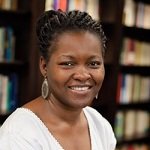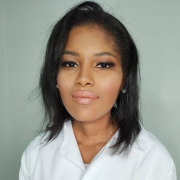How did you become interested in research relating to Hypertension?
I owe my interest in Hypertension research to my background in Medicine.
Growing up as a young girl in the central African country of Cameroon, I was always drawn to helping people in need. This eagerness to help others motivated me to go to medical school to improve healthcare both at an individual and a community level. While studying clinical medicine, I became interested in biomedical research as another way to bring relief to those in need at a much broader level.
After graduating from medical school, I practiced general medicine in a small town in Cameroon, where I treated a wide range of diseases among an underserved population. I was particularly struck by the growing prevalence of hypertension and cardiovascular diseases that often afflict native populations upon exposure to a Western lifestyle, compounding the unending devastation caused by malaria and HIV/AIDS in developing nations. In the face of such challenges, I grew convinced that prevention would be the best hope. However, I realized that prevention cannot be effective without a solid understanding of the fundamental biology of human diseases. Given the very limited financial ability of my patients to pay for treatments at the onset of disease, I became passionate in helping patients fend off diseases through prevention, and this is the reason why I left clinical practice to immerse myself in human physiology research.
Describe your research & the program/lab (info of your supervisor) that you are in?
My PhD dissertation research focused on the neural and cardiovascular reactivity to acute mental stress in various population groups. Working with Dr. Jason Carter at Michigan Technological University, I contributed to the understanding of neural mechanisms involved in the pathophysiology of hypertension. Using the microneurography technique, I demonstrated that muscle sympathetic nerve reactivity to mental stress was reproducible within the same individual across three laboratory visits, paving the way for further studies on sympathetic responses to stress. Further, I showed that overreactivity of the sympathetic nerve was already present in normotensive offspring of hypertensive parents when compared to those without a family history of hypertension, implicating a neural mechanism underlying increased cardiovascular risk in this preclinical population. I was also the first to highlight an exaggerated sympathetic neural reactivity in whites compared to blacks, shedding a new light on race differences in blood pressure regulation.
After graduation, I started a postdoctoral fellowship position at Emory University with Dr. Jeanie Park, a clinician-scientist. Since joining her Human Physiology laboratory, I have taken the lead role on the mechanistic and clinical intervention studies centered on sympathetic over-activity in Post-Traumatic Stress Disorder (PTSD) and prehypertension. I investigate the underlying pathophysiology linking PTSD to a high risk of hypertension and cardiovascular diseases. Using pharmacologic and non-pharmacologic approaches like the modified Oxford technique and the Device Guided Slow Breathing, I study the autonomic nervous system of veterans with PTSD as it relates to blood pressure control.
What do you consider to be your substantial scientific contribution so far (provide Pubmed PMID if possible)?
While I am very proud of all my contributions to the field of hypertension thus far, I would say that I am especially proud of my contribution on race differences in blood pressure regulation, as well as my latest publication highlighting the pro-inflammatory status and the sympathetic dysregulation associated with severe post-traumatic stress disorder (see below).
Fonkoue IT, Schwartz CE, Wang M, and Carter JR. Sympathetic neural reactivity to mental stress differs in black and non-Hispanic white adults. Journal of Applied Physiology. 2018 Jan 1; 124(1):201-207. PMCID: PMC5866443
Fonkoue IT, Marvar PJ, Norrholm SD, Li Y, Kankam ML, Jones TN, Vemulapalli M, Rothbaum BO, Bremner JD, Le NA, Park J. Symptom severity impacts sympathetic dysregulation and inflammation in post-traumatic stress disorder (PTSD). Brain Behavior and Immunity. 2019 Nov 1. pii: S0889-1591(19)30703-2. doi: 10.1016/j.bbi.2019.10.021. [Epub ahead of print].
What is your favourite manuscript from a lab other than your own (provide Pubmed PMID if possible)?
My favorite manuscript to date, and one that sparked my interest in sex and racial differences in blood pressure regulation in humans, is a paper from Dr. Qi FU’s lab at University of Texas Southwestern Medical Center (see below).
Jarvis SS, Shibata S, Okada Y, Levine BD, Fu Q. Neural-humoral responses during head-up tilt in healthy young white and black women. Front Physiol 5: 86, 2014. doi:10.3389/fphys.2014.00086. PMCID: PMC3941214
What facilities are essential for your research?
A clinical examination room with essential research equipment; a laboratory room with a centrifuge, a -80 freezer and a biosafety hood; and a storage space for files and research equipment.
Where do your research strengths lie? Why? What are your research weaknesses? How will you improve?
I believe that my strength lies in my faith in God, my critical thinking abilities and the fact that I am a fast learner. My skills in laboratory techniques and statistics are also a plus in my research.
My major weakness is time management, I tend to bite more than I can chew. I am slowly learning how to be less generous with my time and to prioritize.
Describe your unforgettable (proudest) moment in science, and the most challenging situation that you have had to overcome (lessons learnt) so far?
The first award I received as a graduate student remains my proudest moment in science and one that earned me a high five from my supervisor. I was awarded First Place Poster Presentation out of almost 50 poster presentations during the Graduate Student Colloquium on campus. It was a pivotal moment in my dream of becoming a successful scientist.
The greatest challenge in my scientific career so far has been to relocate with my family across the country to start my current postdoctoral position. I wrote an article about it to share my journey and what I learned in the process (see below). No challenge is permanent, if you persevere, it will eventually pass!
Ida T. Fonkoue. New Post-Doc: Relocating with Children. The Physiologist. November 2018, Vol. 61/No. 6, Cover and p-272. https://www.the-aps.org/docs/default-source/pdf-files/tphys/tphys—november-2018.pdf?sfvrsn=8f393f40_2
At which conference did you first present? How was your experience?
I presented for the first time, outside of campus, at Experimental biology.
It was an unforgettable experience because I had never seen so many scientists in one place. I definitely left inspired and motivated to pursue scientific research.
What upcoming conferences will you be attending, and what is the furthest distance that you have traveled for a conference?
Experimental Biology 2020 in San Diego. I also plan to attend ISH 2020 in Glasgow depending on funding. So far, all my conferences have been in the United States.
How did you learn about ISH/NIN and its activities?
I learned about ISH for the first time at the Joint AHA/ISH Council on Hypertension meeting in Washington DC, 2015. However, life and dissertation happened and I delayed joining the society. Fortunately, when I moved to Emory University for my postdoctoral position, Dr. Brandi Wynne (a member) encouraged me to apply for ISH membership and I finally did.
What area(s) do you wish to specialize in the future?
I am passionate about stress and the link to hypertension and cardiovascular diseases. I wish to continue to study how the sympathetic nervous system, vasculature and inflammation interplay to contribute to the high cardiovascular disease risk of patients living with chronic stress, such as those with post-traumatic stress disorder.
Who is your role model in Science? Why?
This is a tough question given the numerous role models that have kept me inspired and motivated thus far, including my amazing mentors Dr. Jason Carter and Dr. Jeanie Park.
Since I have to choose one, I will say that Dr. Patricia Molina, first Hispanic female and the 88th president of the American Physiological Society, has inspired me since the day I picked up an issue of The Physiologist journal and read about her story and journey. She gave me hope that the shift in career trajectory (from practicing MD to PhD scientist) I made when I moved to the US would not preclude me from having a successful career. In her own words: “Her story reflects what we are capable of achieving with hard work, inquisitiveness, flexibility, good mentors, and a desire to progress.” I COULD NOT HAVE SAID IT BETTER!!!





















